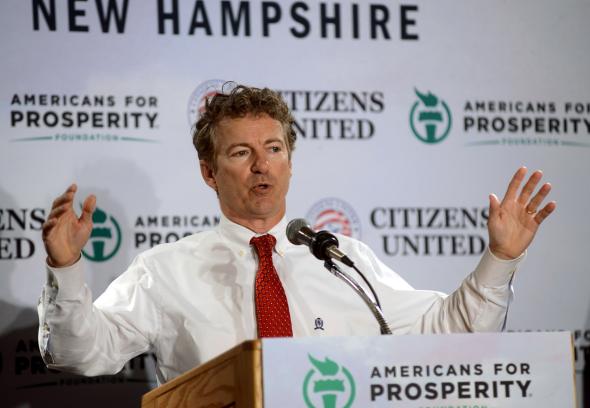John McCain’s Outreach to Non-Republicans Couldn’t Save Him. Could Rand Paul’s Outreach Work?

Photo by Darren McCollester/Getty Images
It's time for another round of my favorite 2016 pregame: the overrating of Rand Paul. This is often misunderstood as an argument that Paul is not an intriguing presidential candidate. He's the most intriguing, by miles! (See how even the talented Ruby Cramer is unable to pull anything resembling information from Hillary Clinton, during a happy-go-lucky parade appearance.) The issue is that Paul's bold journeys beyond the Republican base tend to dazzle the press in ways that beggar reason. This Paul profile by Rebecca Berg provides an unusually good example of the dazzle:
Paul has attracted the most notice for reaching far beyond the traditional Republican base of support — with a speech at Howard University in Washington, a historically black college, and by reaching out to black pastors. “I haven't seen this kind of inclusive thinking since George W. Bush,” said one Republican familiar with Paul’s strategy. “He’s going places where Republicans typically won't go.”
Not sure why the guy got anonymity in order to praise somebody, but isn't this a little unfair to the GOP's last nominee once removed? In 2008 the GOP's primary electorate gave the nod to Sen. John McCain, who had lobbied for immigration reform in the Senate at great (if temporary) cost. He continued reaching out to Hispanics during his run. "I know the people, I know the patriotism, I know the loyalty, I know the respect for the family, the advocacy for life," he told reporters before confirming he'd speak at the National Council for La Raza's meeting. Previously, McCain had spoken (with praise for his audience) at a rally co-hosted by ACORN.
During the 2008 race, McCain also addressed the NAACP. Yeah, sure, it was a doomed effort, given that he was trying to prevent the election of the first black president. But it represented a Republican rapproachment. George W. Bush had spoken to the group in 2000, then skipped its event in 2004, while the IRS investigated it over Julian Bond's increasingly adamant anti-Bush politics.
What did all this outreach get McCain? Boy, not much. His share of the Hispanic vote was the GOP's lowest since 1996, a nadir that would not be matched until ... well, until 2012. And this was after going substantially further to win that vote than Paul did. (He spoke in favor of the general need for reform and the general patriotism of immigrants, but voted against the Senate's bill after failing to win approval for an extra border security amendment.)
Berg's source wasn't talking about Hispanic votes, of course. The reference there was to black voters, and so far the only evidence of a Paul bounce with blacks is ... well, pretty solid. This month's Kentucky Poll of 1,782 registered voters found Paul taking 29 percent of the black vote in a theoretical matchup with Hillary Clinton. John McCain had won only 8 percent of that vote against Barack Obama.
But that was a small sample (Kentucky's electorate is only 10 or 11 percent black) in a state where every bend of the Paul outreach campaign has been covered. The more compelling finding in the poll concerned a possible constitutional amendment to restore voting rights for freed felons. Paul's advocated for that amendment, and it's now winning easily. Outreach works—the question is whether it falls to bits when voters tune in around the election and remember which party represents most of their goals.
